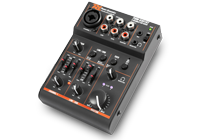Studio Mixing Desks
With a studio mixing desk, you have complete control over the audio in your studio.
Read More-
Vonyx AM5A 5 Channel Powered Mixer with DSP & BluetoothRegular Price £249.00 Special test Price £219.00
- 2 x 500W power amplifier
- Bluetooth connectivity, MP3 player with USB port and SD slot
- 48V phantom power
- 16 digital effects (DSP)
- Use up to 4 microphone and a line input
In stockRegular Price £249.00 Special test Price £219.00Free delivery and weekend delivery available
In stock -
Vonyx VMM-P500 4-Channel Music Mixer with MP3 & BluetoothRegular Price £79.00 Special test Price £70.99
- 4 channel home studio mixer with phantom power, ideal for podcasts
- Microphone and Instrument input to achieve better digital signals when producing music or live sound
- Mix onboard effects into your recordings, including delay and reverb
- 16 Mix presets to choose from and refine
- Suitable for indoor and outdoor solo performances, wedding singers etc
- Detailed specs on the product page
In stockRegular Price £79.00 Special test Price £70.99Free delivery and weekend delivery available
In stock -
Vonyx VMM-F401 4 Channel Mixer£85.00
- 2 Mono Microphone / Line Input (XLR and 6.3mm Jack)
- Stereo line input (6.3mm Jack)
- Tape input (RCA)
- + 48V Phantom power
In stockIn stock -
Vonyx 6 Channel VMM-K602 DSP MixerRegular Price £129.00 Special test Price £113.00
- 4 Mono microphone-/line input (Combi XLR/Jack)
- 1 Stereo line input (6.3mm Jack)
- Internal sound card with record function USB/PC (USB connection)
- 16 Pre-programmed DSP functions
In stockRegular Price £129.00 Special test Price £113.00Free delivery and weekend delivery available
In stock -
-
Vonyx VMM-K402 4 Channel Mixer£100.00
- 2 Mono microphone-/line input (Combi XLR/Jack)
- 1 Stereo line input (6.3mm Jack)
- Internal sound card with record function USB/PC (USB connection)
- 16 Pre-programmed DSP functions
In stockIn stock -
Vonyx VMM-K802 8 Channel Music MixerRegular Price £155.00 Special test Price £107.00
- 6 Mono microphone-/line input (Combi XLR/Jack)
- 2 Stereo line input (6.3mm Jack and RCA)
- Internal sound card with record function USB/PC (USB connection)
- 16 Pre-programmed DSP functions
In stockRegular Price £155.00 Special test Price £107.00Free delivery and weekend delivery available
In stock -
PD PDM-D301 3-Channel Mini USB DJ MixerRegular Price £49.99 Special test Price £41.00
- Combined Jack/XLR input with Phantom power
- 1 Stereo input channel with level control
- 1 Mono input channel with ultra low noise microphone preamplifiers
- 2-Way Equalizer on both channels
In stockRegular Price £49.99 Special test Price £41.00Free delivery and weekend delivery available
In stock -










